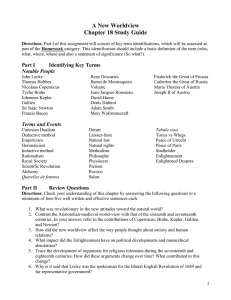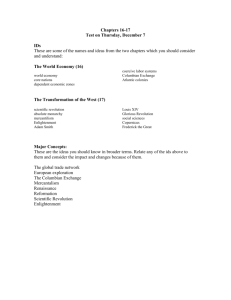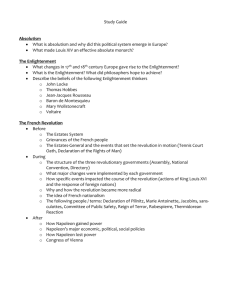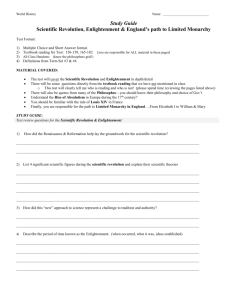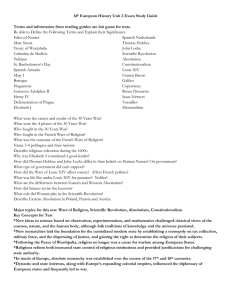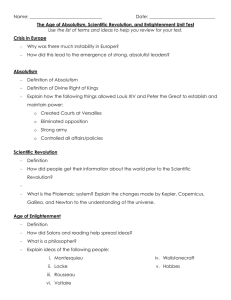AP Euro Study Guide: Absolutism, Constitutionalism, New Worldview
advertisement
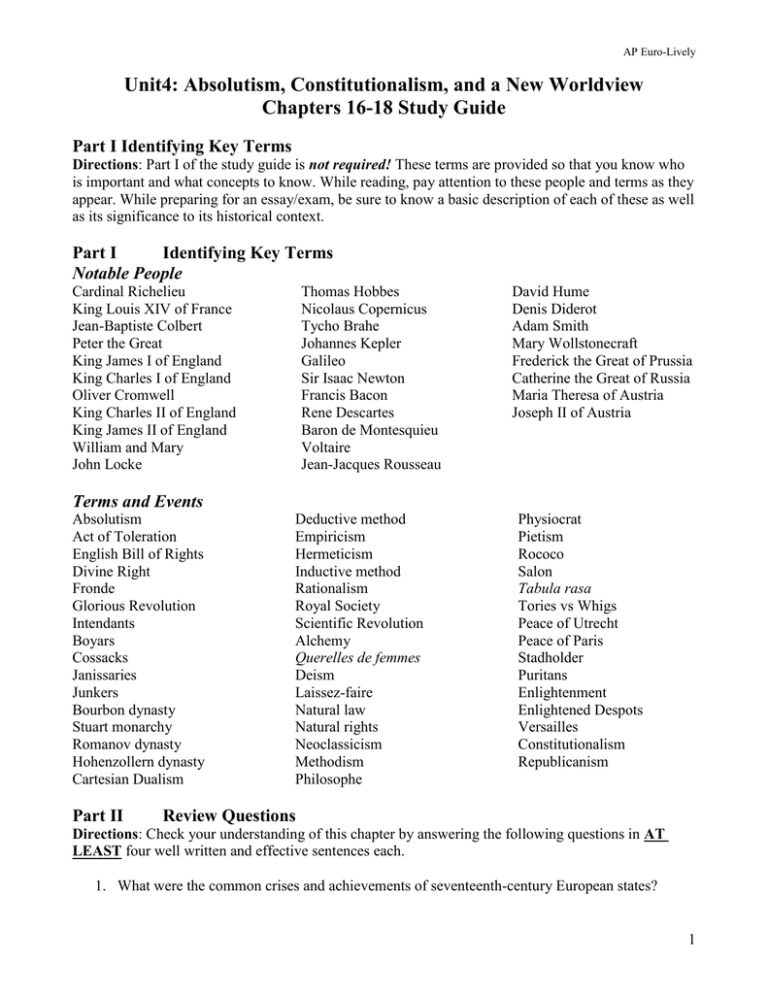
AP Euro-Lively Unit4: Absolutism, Constitutionalism, and a New Worldview Chapters 16-18 Study Guide Part I Identifying Key Terms Directions: Part I of the study guide is not required! These terms are provided so that you know who is important and what concepts to know. While reading, pay attention to these people and terms as they appear. While preparing for an essay/exam, be sure to know a basic description of each of these as well as its significance to its historical context. Part I Identifying Key Terms Notable People Cardinal Richelieu King Louis XIV of France Jean-Baptiste Colbert Peter the Great King James I of England King Charles I of England Oliver Cromwell King Charles II of England King James II of England William and Mary John Locke Thomas Hobbes Nicolaus Copernicus Tycho Brahe Johannes Kepler Galileo Sir Isaac Newton Francis Bacon Rene Descartes Baron de Montesquieu Voltaire Jean-Jacques Rousseau David Hume Denis Diderot Adam Smith Mary Wollstonecraft Frederick the Great of Prussia Catherine the Great of Russia Maria Theresa of Austria Joseph II of Austria Terms and Events Absolutism Act of Toleration English Bill of Rights Divine Right Fronde Glorious Revolution Intendants Boyars Cossacks Janissaries Junkers Bourbon dynasty Stuart monarchy Romanov dynasty Hohenzollern dynasty Cartesian Dualism Part II Deductive method Empiricism Hermeticism Inductive method Rationalism Royal Society Scientific Revolution Alchemy Querelles de femmes Deism Laissez-faire Natural law Natural rights Neoclassicism Methodism Philosophe Physiocrat Pietism Rococo Salon Tabula rasa Tories vs Whigs Peace of Utrecht Peace of Paris Stadholder Puritans Enlightenment Enlightened Despots Versailles Constitutionalism Republicanism Review Questions Directions: Check your understanding of this chapter by answering the following questions in AT LEAST four well written and effective sentences each. 1. What were the common crises and achievements of seventeenth-century European states? 1 AP Euro-Lively 2. Louis XIV declared his goal was “one king, one law, one faith.” Analyze the methods the king used to achieve his objective and discuss the extent to which he was successful. 3. Why can it be said that the palace of Versailles was used as a device to ruin the nobility of France? Was Versailles a palace or a prison? 4. How and why did the constitutional state triumph in the Dutch Republic and England? 5. What were the immediate and long-range causes of the English Civil War of 1642-1649? What were the results? 6. Why is it said that Locke was the spokesman for the liberal English Revolution of 1689 and for representative government? 7. What were the reasons for the re-emergence of serfdom in eastern Europe in the early modern period? 8. What role, if any, did war play in the evolution of absolutism in eastern Europe? 9. Analyze the major ways through which Tsar Peter the Great sought to reform society and its institutions in order to strengthen Russia and its position in Europe. 10. Contrast the rise of Austria in the late 17th and 18th centuries with the decline of Poland in the 18th century. 11. Why would the reign of the Great Elector be regarded as “the most crucial constitutional struggle in Prussian history hundreds of years”? What did he do to increase royal authority? Who were the losers? 12. Describe the relationship between politics and economics during the wars of the late 17th and 18th centuries. Use at least two specific examples. 13. What was revolutionary in the new attitudes toward the natural world? 14. Contrast the Aristotelian-medieval world-view with that of the sixteenth and seventeenth centuries. In your answer, refer to the contributions of Copernicus, Brahe, Kepler, Galileo, and Newton? 15. How did the new scientific theory and discoveries alter the concept of God and religion? Did science, in fact, come to dictate humanity’s concept of God? 16. How did the new worldview affect the way people thought about society and human relations? 17. Trace the development of arguments for religious toleration during the seventeenth and eighteenth centuries. How did these arguments change over time? What contributed to this change? 18. Compare and contrast John Locke’s theory of the social contract and Thomas Hobbes’ theory of the social contract. Describe how one of these figures influenced the work of JeanJacques Rousseau. 19. What impact did the Enlightenment have on political developments and monarchical absolutism? 20. How were Scientific Revolution and Enlightenment ideas made public and popular amongst the educated classes of Europe in the late 17th and 18th centuries? 21. To what extent did the Enlightenment express optimistic ideas in eighteenth-century Europe? Illustrate your answer with reference to at least 3 specific individuals and their works. 22. To what extent were women affected by the Scientific Revolution and the Enlightenment? Part III Chronological Awareness Directions: Place the following events in the correct chronological order. Provide the year of each event. Since the events are given to you in a sequence that is out of chronological order, please reorder the events correctly. In the event that one or more of the events listed below do not have a 2 AP Euro-Lively single year in which it took place, provide the appropriate date ranges. Rewrite this list in the correct chronological order, providing the year of the event, occurrence, or trend. 1. King Louis XIV of France revokes the Edict of Nantes 2. King Charles I of England is executed 3. Glorious Revolution 4. Publication of Diderot’s Encyclopedia 5. Peace of Paris (End of Seven Years War) 6. Galileo appears before the Roman Inquisition 7. Frederick II ascends the throne of Prussia 8. Copernicus publishes On the Revolutions of the Heavenly Spheres 9. Peace of Utrecht 10. Thomas Hobbes publishes Leviathan Part IV Analyzing Primary Sources Directions: Read the passage below and answer the questions below the passage. Source: Henri, Prince of Conde, sword nobleman, pamphlet, Paris, 1614. The prices of all judicial and financial offices have risen to excessive heights. There is no longer any reward for virtue, since all power now belongs to favors, alliances, kinship, and money. The sword nobility is now banished from judicial and financial affairs for lack of money. 1) What is the historical context of the situation described in the passage above? 2) Describe Henri’s point of view, and analyze the significance of one of the following in determining his’s point of view: - Henri’s occupation and place in society - Henri’s purpose for writing - Henri’s audience Note: Incomplete study guides will receive a 10 point penalty. This will not be allowed to be made up via redo. Organize your time and work on your study guide a little bit at a time. Substantially incomplete study guides will be graded, but considered late, and only allowed to be redone up to 25 points. Study Guide Grading Rubric. 50 points. Review Questions (20 points) - 4 questions will be selected at random from those above. Each will be worth 5 points. Document Analysis (10 points) – This section is worth 10 points. Points will be deducted for insufficient and/or inaccurate responses. Chronology (10 points) - This section is worth 10 point. Points will be deducted for each incorrect response. Overall Completion (10 points) - 10 points will be awarded for completion of all questions and parts. 3
